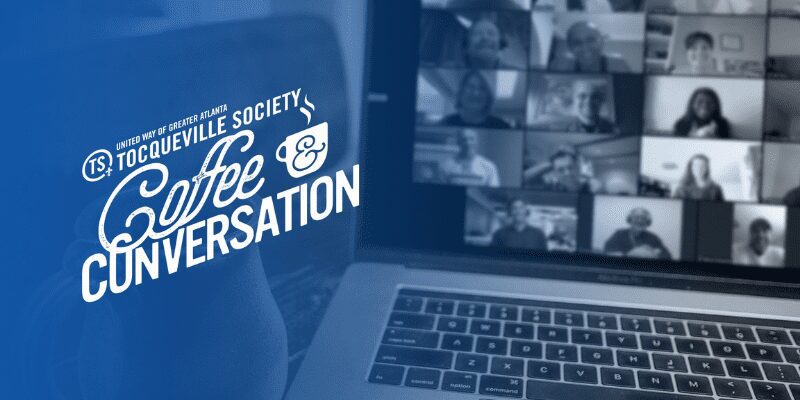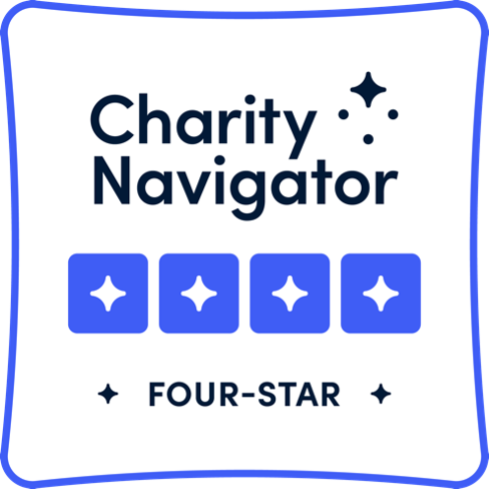In late September, United Way of Greater Atlanta’s Tocqueville Society met for the second edition of its “Coffee & Conversation” series.
These interactive, panelist-led dialogues have acted as a meeting ground for Greater Atlanta leaders across aisles of work to discuss the issues most directly affecting our region.
This month, Tocqueville Society’s leadership unanimously decided it needed to set aside time to dissect issues of social injustice and racial inequity.
Chris Peck, former Vice President for UPS and current Tocqueville Society Chair, was joined by fellow Tocqueville Society members Aiko Bethea, Glenn Mitchell, Shan Cooper and Milton J. Little, Jr. to uncover the opportunities executive leadership had to advance social change at scale.
Peck, serving as moderator for the discussion, opened the conversation by making some poignant remarks about COVID-19’s disproportionate effect on the Black community.
“Years of disinvestment and systemic barriers to opportunity have placed residents of these communities at a severe disadvantage from their peers, leaving them vulnerable to the worst economic and health effects of COVID-19.”
But COVID-19 isn’t the only prejudiced pandemic wreaking havoc in America. There has also been the long-standing disease of racialized violence, which has cost us the lives of such American citizens as George Floyd, Breonna Taylor and Ahmaud Arbery this year alone.
Before these tragedies surfaced, the PEW Research Center released findings indicating that majorities of both Black and white Americans thought Black people were treated less fairly than white Americans in dealing with the police and the criminal justice system as a whole.
This year, that sentiment translated to solidarity. A Gallup poll indicated in late July that about two in three Americans supported the nationwide protests about racial injustice.
“The civil unrest that has followed [these deaths] signals that our community is more prepared than ever to start confronting these issues head on,” said Peck.
With these thoughts in mind, panelists began weighing in on how leaders could seize this moment to advance racial equity goals. Aiko Bethea, principal and founder of RARE Coaching and Consulting, was the first to chime in.
“We’re at another inflection point,” said Bethea. “There is a hunger, there is an appetite for wanting to have impact, for wanting to make a change.”
Bethea further explained that, to uncover that change, those who are accustomed to teaching would need to take time to listen.
“I think that, oftentimes, the people of color have the knowledge and need to be in the seat of the teachers,” said Bethea. “But the people who are used to being the knowers don’t move out of the way to be curious and be a learner.”
Shan Cooper, who currently leads the Atlanta Committee for Progress, emphasized that leaders would need to engage more actively with the lived experiences of our community members to accelerate the learning Bethea described.
“If we’re going to solve the challenges that we face, collectively we have got to be willing to talk about it and have truthful conversations about it,” said Cooper.
Glenn Mitchell, a managing partner at Ernst & Young (EY) in Atlanta, proudly described how his organization is facilitating many of those conversations on equity en masse.
“Honestly, conversations that weren’t there in the past and now they are and they’re very open,” said Mitchell. “It’s bringing, in my case, thousands of people together.”
Mitchell went on to explain that EY, as a company, is doing everything it can to eradicate discrimination and racism both in the workplace and the surrounding community. The company has taken measures to evaluate their internal talent and business processes with a specific focus on equity and race, and recently reported a $3 million investment in organizations committed to fighting social injustices.
Milton J. Little, Jr., a graduate of one of the colleges receiving money thanks to the new investment from EY, was delighted to hear the news.
“Glenn, as much money as you can send to Morehouse College, that would be wonderful,” said Little.
Little, who has been President and CEO of United Way of Greater Atlanta since 2007 and previously served as the COO of the National Urban League, was quick to point out that this conversation on equity has long been of central importance to his career.
“I’m blessed to have come to Atlanta with a forward-leaning board that makes sure that we’re not simply creating a quota system for diversity at the board level,” said Little. “We are actively looking for diversity of thought, diversity of geography, diversity of perspective, diversity of expression.”
And that value for diversity in board leadership is simultaneously reflected in United Way’s work with the Child Well-Being Movement. United Way adopted the Movement in 2017, committing itself to engage and bring together people and resources to drive sustainable improvements in the well-being of children, families and individuals in the community.
When the Movement launched in 2017, nearly 500,000 children were living in areas that lacked the opportunities and resources needed to reach their full potential. These areas were largely communities of color, where 24% to 84 % of families of four had an income that was at or below 250 percent of the poverty line for the state of Georgia.
Little stated that – when this work first began – the community wasn’t ready to have a “full-throated conversation about race.”
“We used Child Well-Being as a proxy for what the community didn’t want to talk about,” said Little. “You look at the demographics where Child Well-Being is lowest, it is inescapable that it is about race, it is about ethnicity and it is about place.”
But whatever discomforts previously existed about race have all but disappeared in 2020.
United Way of Greater Atlanta launched its United for Racial Equity and Healing Fund in July to tackle the systemic issues underlying the correlation between race and zip codes, place and equity. Funds will be invested in organizations in Greater Atlanta that are primarily focused on racial inequity challenges in their communities and on a regional level.
Through such efforts, United Way hopes to catalyze long-lasting change that addresses the root causes of racial inequities.
Shan Cooper believes that change would benefit everybody.
“We’ve got the same world to live in,” said Cooper. “We’ve got to work together to shape our collective future.”
If you want to help our organization advance the work of racial equity and shape Greater Atlanta’s collective future, donate to the United for Racial Equity and Healing Fund today.





